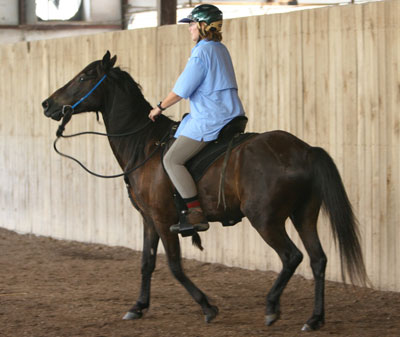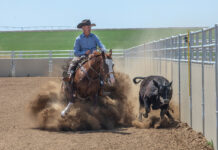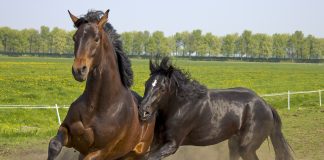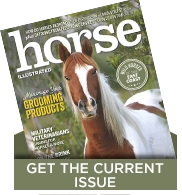 A hollow topline,resistance to the bit and a general unwillingness to work can be caused by several physical problems. |
A horse with a lousy outlook on work is often labeled as belligerent. However, his resistance may not be the result of a bad attitude. He could be reacting to physical discomfort. Horses have limited ways of expressing themselves, but even though they don’t speak aloud they find ways to communicate what they are feeling. Behavior is a horse’s best means of relaying information about their physical condition. This may present as reluctance to pick up a gait, refusal to move forward, avoiding a particular lead, and difficulty turning in one direction. Or, your horse may share his displeasure by pinning his ears, biting, kicking, acting lethargic, or feeling anxious.
Dental Discomfort
Your horse can experience pain in his mouth for a multitude of reasons. Points, hooks, wolf teeth, and imbalances of the chewing surfaces are common problems. They can lead to ulcers, restricted jaw function, headaches, and make a happy horse miserable. A horse that fights the bit (bitless bridles are also uncomfortable to a horse with points on his teeth) or has difficulty maintaining a headset may be suffering from oral discomfort. Have your horse checked yearly by an equine dentist to ensure that he has a sound mouth.
Uncomfortable Tack
It is essential that your bit and saddle fit your horse properly so that he can move his body comfortably and respond to your cues with ease. Ill-fitting tack is a common source of behavioral problems while riding. Bucking, rearing, a tense or hollow topline, and rough or inconsistent gaits are some of the many symptoms of discomfort. A horse that refuses to take the bit or saddle is often blamed for having a lousy work ethic when he is actually trying to avoid the painful tack.
Ulcers
Ulcers are more common than you think. They can develop quickly in horses under physical or dietary stress and can account for the deterioration of a once cooperative attitude. If your stomach lining was being eroded by acid you might be cranky too.
Limb, joint, hoof, or muscle injuries
Horses are notorious for doing damage to themselves. A slip in a muddy paddock, a kick from a pasture mate, and metabolic issues are a few examples of hidden hurts that affect your horse’s willingness to work. While a serious injury or unsoundness is easy to see, many problems aren’t that obvious. Any change in your horse’s behavior could be clue that he’s hurting (persistent training problems can be caused by physical distress as well). This is when a visit from your veterinarian or equine osteopath can be beneficial. If your horse’s bad attitude is the result of pain, discovering the cause will give you a chance to fix it and improve life for both of you.
Liked this article? Here are others you’ll enjoy:
Is Your Horse Unsafe?
How to Speak Horse
Reasons for Horse Behavior Problems







Very good article…it brings me to think, not all “horse training” issues, may be just discomfort or pain of some sort.
very good article.
I would think one should first measure the horse’s performance under saddle to his/her performance in groundwork because groundwork is the fundamental. If there is a significant difference between the two, the appraise the issues in this article; if not, go back to your ground work routine. (Too many horsepeople overlook the importance of goundwork!)
Great advice. In my experience most horses in a lousy mood have some pain or discomfort. Sometimes it’s as simple as stiffness that needs some walking out before real work begins or even a change in the weather making them feel a bit down but never nothing.
Thank you all very much for your feedback. Daniel, I completely agree that comparing your horse’s behavior and movement without the influence of tack or rider is extremely valuable.